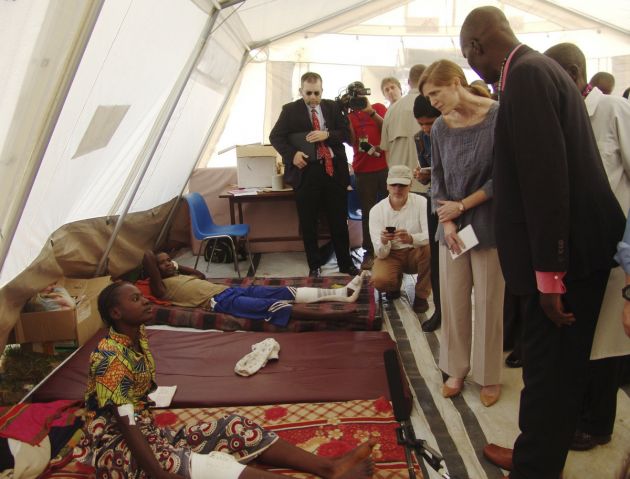Stoking religious differences fuels Central Africa conflict, says UN rights chief

GENEVA - The U.N. High Commissioner for Human Rights has warned that religious differences are being manipulated by political leaders, with deadly consequences in the Central African Republic.
The Associated Press reported that after days of relative calm, sectarian violence once more exploded Friday in violence-wracked Central African Republic, also known as CAR, claiming at least 30 lives.
The news agency cited an attack by a mob of young men wearing crucifixes on a mosque Friday where they pounded holes into its cinderblock walls and methodically stripped apart the corrugated iron roof and tossed the pieces on the ground.
"Too often in history we have seen the political manipulation of religious and ethnic differences result in horrific violations and long-term damage to the social fabric of a country," human rights chief Navi Pillay warned in a statement Friday.
"I urge leaders at both national and local levels in the Central African Republic to stop stoking violence on the basis of religion."
She called for urgent, sustained national and international efforts to avert disaster in the Central African Republic.
LAUDABLE EFFORTS
At the same time, the high commissioner highlighted the "laudable efforts" of religious leaders such as the Roman Catholic Archbishop of Bangui, Dieudonne Nzapalainga; Pastor Nicolas Guerékoyamé, and the Imam, Omar Kobina Layama, in spreading the message of peace between communities.
"The archbishop, the pastor and the Imam have been showing important leadership at a time when it is so badly needed by their followers, and they have managed, with some success, to defuse tensions between communities," Pillay said.
"We have seen young Muslims take it upon themselves to protect churches, and churches are serving as safe havens for internally displaced people, regardless of their religious backgrounds," said the UN high commissioner.
"Such developments are extremely encouraging and I call on all religious and community leaders to redouble their efforts to ensure that entire communities are not vilified in the dangerous cycle of violence and reprisals that we have been witnessing."
Of CAR's five million people, Christians split almost equally between Catholics and Protestants make up 50 percent of the population, while Muslims account for some 15 percent.
Some officials are fearful that the CAR killing cycle might escalate to similar proportions to the Rwanda genocide of 1994.
When Christian militias attacked Bangui in early December they triggered bloody reprisals by Muslim Seleka fighters who seized power in March.
WAR CRIMES
War crimes and crimes against humanity are being committed in the Central African Republic, Amnesty International said November 19 after a two-week mission to the country.
"Our in-depth research on the ground in the Central African Republic over the past two weeks has left no room for doubt that war crimes and crimes against humanity are being committed by all parties to the conflict," said Christian Mukosa, Amnesty International's Central Africa expert.
The U.N.'s Pillay said Christian and Muslim leaders in towns, including Bouar, had also held joint meetings and are working together to spread messages of tolerance to the civilian population.
She urged all sides to come together and resolve the situation in the country through dialogue.
"The only way to prevent large-scale suffering in the country is for all sides to renounce violence and move forward through constructive dialogue," said Pillay.
The international community needs to prioritize the disarmament of all sides and ensure accountability for perpetrators of serious human rights violations.
"The establishment of a Commission of Inquiry should send a strong message to perpetrators of violations that the international community is committed to holding them accountable."
The office of the high commissioner reported ongoing violence, intimidation and a governance vacuum.
Pillay warned that the reported involvement of armed elements from neighboring countries heightens the risk of a crisis that, if left unchecked, may become dangerously difficult to control.
A UN human rights monitoring team in the Central African Republic has been documenting human rights violations committed in recent months, including killings, sexual violence, arbitrary detention, attacks on hospitals, destruction of property and targeting of individuals on the basis of their religion.
"These developments are extremely worrying and should ring alarm bells around the world for sustained and urgent efforts to be taken to prevent the Central African Republic from plunging into disaster," said Pillay.